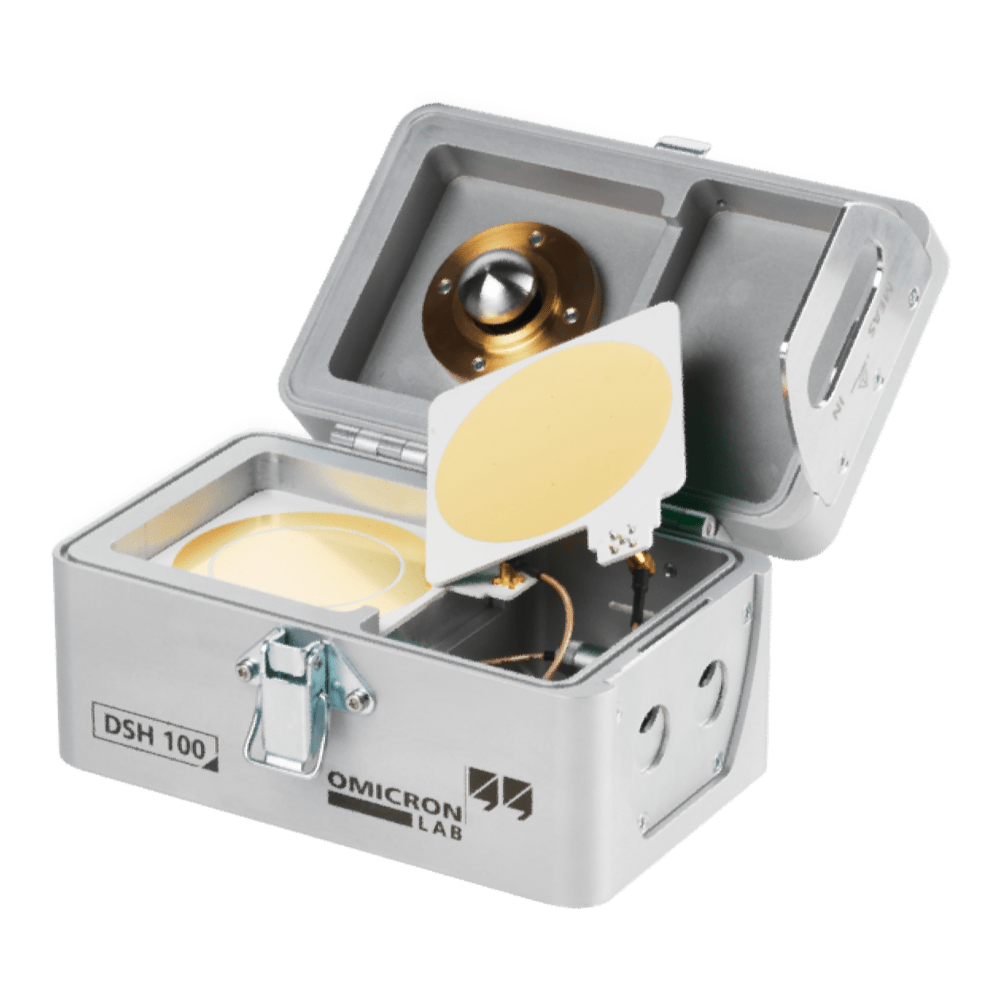
Key Features
Overview
The OMICRON-Lab DSH 100 Dielectric Sample Holder represents cutting-edge technology for comprehensive material characterisation across multiple engineering disciplines. This precision instrument enables accurate analysis of solid dielectric materials including nano-composites, polymers, epoxy resins, insulation papers, glasses, and thin films.
Professional Engineering Solution
Engineered with professional research requirements in mind, the DSH 100 delivers exceptional performance through its innovative parallel plate electrode configuration with integrated guard ring. The system supports measurements across an impressive frequency range of 5 µHz to 5 MHz, accommodating sample thicknesses from 0.1 mm to 20 mm whilst maintaining measurement accuracy to international standards, including ASTM D150 and IEC 62631-2-1.
Versatile Integration Capability
Designed for maximum versatility, the DSH 100 integrates seamlessly with impedance analysers, LCR metres, and the renowned Bode 100 instrument. Its compact design features full metal shielding for measurement precision, coupled with a robust safety interlock mechanism ensuring operational security. The exchangeable electrode design enables analysis of curing processes in materials such as epoxy systems, making it invaluable for advanced materials research.
With its comprehensive temperature range capability (-55°C to +125°C) and professional-grade construction, the DSH 100 provides engineers with reliable, repeatable measurements essential for materials development, quality control, and research applications.
Downloads
Why Engineers Choose The OMICRON-Lab DSH 100 Dielectric Sample Holder
Precision Material Characterisation
Standards Compliance Assurance
Versatile Integration Capability
Frequently Asked Questions
Have a Question?
-
Can the DSH 100 monitor epoxy curing processes in real-time?
Yes, the exchangeable electrode design and wide frequency range make the DSH 100 particularly effective for monitoring epoxy curing processes, tracking changes in dielectric properties as materials transition from liquid to solid states.
-
What safety features are incorporated in the DSH 100 design?
The system includes a mandatory safety interlock mechanism preventing operation with open housing, full metal shielding, and professional-grade construction ensuring operator safety during high-voltage measurements.
-
How does the DSH 100 compare to the more expensive Keysight 16451B dielectric test fixture?
Whilst the Keysight 16451B offers higher frequency capability (up to 30MHz), the DSH 100 provides superior low-frequency resolution (5µHz) and higher operating voltage (200V peak vs 42V), making it ideal for comprehensive dielectric analysis at professional-grade specifications.
-
What temperature range is supported for material testing applications?
The DSH 100 operates from -55°C to +125°C, enabling material characterisation under diverse environmental conditions including cryogenic and elevated temperature applications.
-
How does the guard ring electrode configuration improve measurement accuracy?
The integrated guard ring eliminates fringing field effects and stray capacitances that can compromise measurement accuracy, particularly important for low-loss materials and precise permittivity measurements.
-
What sample sizes and thicknesses can the DSH 100 accommodate?
The system handles sample sizes from 50mm x 50mm to 70mm x 70mm with thickness ranging from 0.1mm to 20mm, covering most standard material testing requirements.
-
Can the DSH 100 be used with different impedance analysers besides the SPECTANO 100?
Yes, the DSH 100 integrates with various impedance analysers, LCR metres, and the Bode 100 instrument through standard triaxial connections, providing maximum laboratory flexibility.
-
What frequency range does the DSH 100 support for dielectric measurements?
The system provides comprehensive frequency coverage from 5 µHz to 5 MHz, enabling analysis of various polarisation mechanisms and dielectric phenomena across multiple frequency decades.
-
Which international standards does the DSH 100 comply with for dielectric testing?
The DSH 100 fully complies with ASTM D150 and IEC 62631-2-1 (2018) standards, ensuring internationally recognised measurement accuracy and traceability for professional applications.
-
What types of materials can the DSH 100 analyse effectively?
The DSH 100 is specifically designed for solid dielectric materials including nano-composites, polymers, epoxy resins, insulation papers, glasses, thin films, and composite materials used in electronic and electrical applications.

